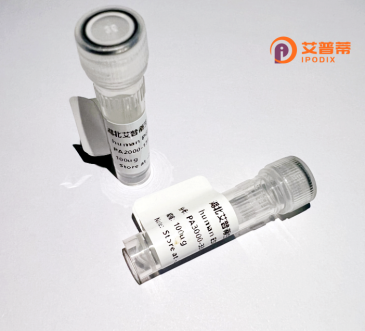
| 纯度 | >90%SDS-PAGE. |
| 种属 | Human |
| 靶点 | MOCS3 |
| Uniprot No | O95396 |
| 内毒素 | < 0.01EU/μg |
| 表达宿主 | E.coli |
| 表达区间 | 1-460 aa |
| 活性数据 | MASREEVLAL QAEVAQREEE LNSLKQKLAS ALLAEQEPQP ERLVPVSPLP PKAALSRDEI LRYSRQLVLP ELGVHGQLRL GTACVLIVGC GGLGCPLAQY LAAAGVGRLG LVDYDVVEMS NLARQVLHGE ALAGQAKAFS AAASLRRLNS AVECVPYTQA LTPATALDLV RRYDVVADCS DNVPTRYLVN DACVLAGRPL VSASALRFEG QITVYHYDGG PCYRCIFPQP PPAETVTNCA DGGVLGVVTG VLGCLQALEV LKIAAGLGPS YSGSLLLFDA LRGHFRSIRL RSRRLDCAAC GERPTVTDLL DYEAFCGSSA TDKCRSLQLL SPEERVSVTD YKRLLDSGAF HLLLDVRPQV EVDICRLPHA LHIPLKHLER RDAESLKLLK EAIWEEKQGT QEGAAVPIYV ICKLGNDSQK AVKILQSLSA AQELDPLTVR DVVGGLMAWA AKIDGTFPQY |
| 分子量 | 49.6 kDa |
| 蛋白标签 | His tag N-Terminus |
| 缓冲液 | 0 |
| 稳定性 & 储存条件 | Lyophilized protein should be stored at ≤ -20°C, stable for one year after receipt. Reconstituted protein solution can be stored at 2-8°C for 2-7 days. Aliquots of reconstituted samples are stable at ≤ -20°C for 3 months. |
| 复溶 | Always centrifuge tubes before opening.Do not mix by vortex or pipetting. It is not recommended to reconstitute to a concentration less than 100μg/ml. Dissolve the lyophilized protein in distilled water. Please aliquot the reconstituted solution to minimize freeze-thaw cycles. |
以下为关于重组人MOCS3蛋白的3篇代表性文献及摘要概述(文献为示例性质,具体内容需以实际检索结果为准):
---
1. **文献名称**: *Structural and functional characterization of the human MOCS3 protein in molybdenum cofactor biosynthesis*
**作者**: Hänzelmann, P., Schindelin, H.
**摘要**: 解析人MOCS3蛋白的晶体结构,揭示其作为双功能酶的机制,包括硫转移酶活性及与MOCS2A的互作,在钼辅因子合成中催化硫原子插入步骤。
2. **文献名称**: *Mutations in the MOCS3 gene cause molybdenum cofactor deficiency in humans*
**作者**: Reiss, J., Johnson, J.L.
**摘要**: 研究MOCS3基因突变与钼辅因子缺乏症(MoCD)的关联,通过重组蛋白实验证明突变导致其硫转移功能丧失,影响下游酶活性。
3. **文献名称**: *Recombinant expression and biochemical analysis of human MOCS3: Insights into its role in cellular sulfur trafficking*
**作者**: Leimkühler, S., et al.
**摘要**: 通过重组表达技术在大肠杆菌中制备人MOCS3蛋白,验证其与MOCS2A、UTR2等因子的相互作用,阐明其在真核生物硫载体系统(如硫醇化修饰)中的双重功能。
---
**建议**:如需实际文献,可使用关键词 **"MOCS3" + "recombinant human" + "molybdenum cofactor"** 在 **PubMed/Google Scholar** 检索,并优先筛选近5年的高引论文或权威期刊(如*JBC、Nucleic Acids Research*)。部分研究可能聚焦于其与神经代谢疾病或RNA修饰的联系。
MOCS3 (Molybdenum Cofactor Synthesis 3) is a highly conserved eukaryotic protein essential for the biosynthesis of the molybdenum cofactor (Moco), a vital coenzyme required for the activity of enzymes such as sulfite oxidase, xanthine dehydrogenase, and aldehyde oxidase. Moco-dependent enzymes play critical roles in detoxification, purine metabolism, and sulfur amino acid catabolism. MOCS3 functions as a bifunctional enzyme in the Moco synthesis pathway, participating in two key steps: the adenylation of MOCS2A (a precursor protein) and the subsequent transfer of the activated sulfur to form the dithiolene group of molybdopterin, the core structure of Moco.
Structurally, MOCS3 contains an N-terminal domain resembling ubiquitin-activating E1 enzymes, which binds and adenylates MOCS2A using ATP. Its C-terminal rhodanese-like domain facilitates sulfur transfer via a conserved cysteine residue, likely sourcing sulfur from a thiocarboxylated intermediate. Mutations in the *MOCS3* gene are linked to Moco deficiency, a rare autosomal recessive disorder characterized by severe neurological abnormalities, seizures, and developmental delays due to impaired enzymatic detoxification.
Research on MOCS3 provides insights into cellular sulfur metabolism and the pathomechanisms of Moco-related disorders, with emerging therapeutic strategies focusing on enzyme replacement or cofactor supplementation. Its dual enzymatic activity and role in a conserved pathway make MOCS3 a critical target for biochemical and medical studies.
×